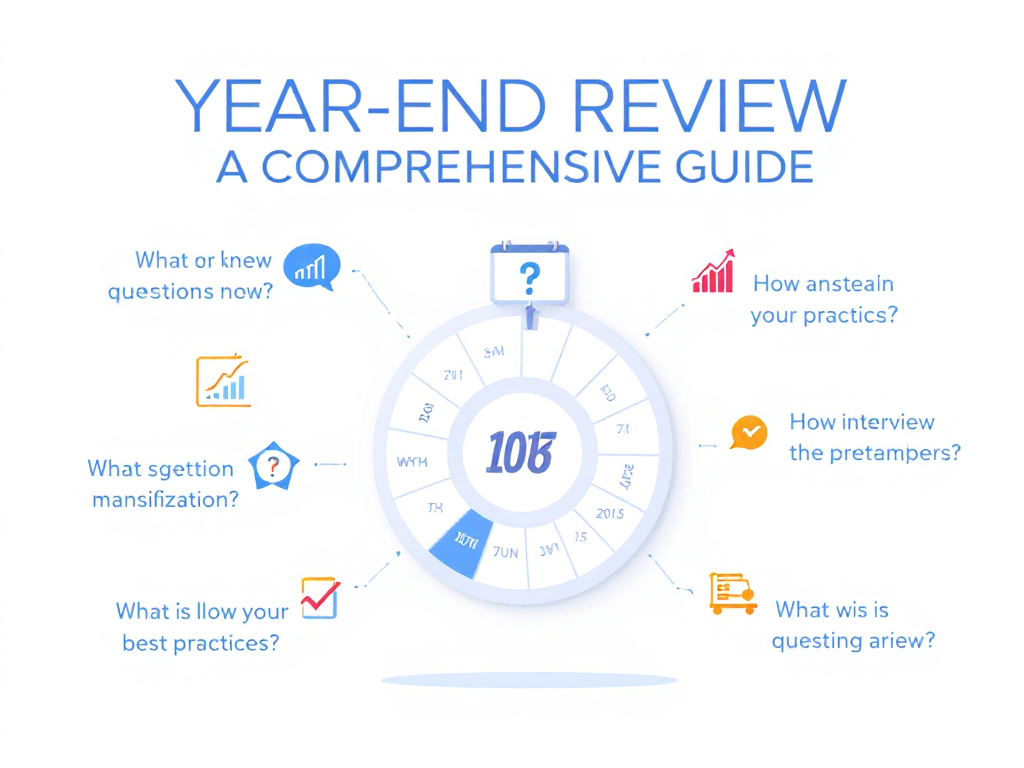Year-end review
1/26/2025
3 min read
What Is a Year-End Review? A Comprehensive Guide
What is a Year-End Review?
For many organizations, the year-end review is an important part of the annual performance management cycle. It is a tool for formal evaluation that assists in gauging the performance of an employee in the previous year. This process helps in recognizing the strengths and weaknesses of the employees and also goes a long way in building goals for the upcoming year.
The year-end review is critical in a corporate environment to pinpoint discrepancies in individual objectives vs. strategic direction of the company. It serves as a stage for managers and employees to have thoughtful conversations, cultivating a culture of constant growth and professional learning. Besides, they can also guide promotions, compensation, and professional improvement decisions that align with the goals of both the employee, as well as the company.
Key Concepts
The importance of the major concepts entailed with the year-end review process should be understood by both managers and employees. The key features usually consist of:
- Self-Analysis: Employees are usually asked to assess their own results, which includes focusing on their accomplishments, obstacles, and growth areas. Understanding this process promotes ownership of career development among employees.
- This assessment serves as an external perspective and contextualizes and balances the self-assessment with organizational purpose on both ends.
- Feedback Loops: Constructive criticism is a cornerstone of the year-end review process. It is a two way street where everyone shares feedback & suggestions with each other. Year-end evaluations are more meaningful when there is feedback throughout the year.
Think of a sports coach reviewing a players annual performance. The employee (the player) evaluates their skills and game strategies, the manager (the coach) assesses their performance metrics in an objective way. They review the feedback received and establish new objectives to improve future performance.
Practical Examples
Adoption Across Industries
Year end reviews are not a one-size-fits-all and are implemented in different industries and suited according to organisation needs. For instance, in tech companies, they may emphasize project milestones, code quality, and contribution to innovation. In sales driven organizations, you may emphasize on targets met against idle, customer feedback and revenue growth.
Imagine a tech company where developers have to submit code snippets from their most technical projects. “All of these pieces of evidence become tangible, and allowing them to measure and understand technical acumen and problem solving.”
Success Stories
Many companies have seen concrete results from a good year-end review. For example, one global retail company made changes to its performance review system to help managers focus less on data points and more on employee development. As a result, we saw a 20% boost in employee engagement, and customer satisfaction scores went up considerably.
Best Practices
To conduct year-end reviews effectively, some best practices should be followed:
- Do’s:
- Prepare thoroughly by collecting data and examples throughout the year.
- Foster open communication and reciprocal criticism.
- Don’ts
- Do not focus just on the past few months — look at a year’s worth of performance.
- Use the review as a resource, but don’t let it be the only feedback; make sure you’re having regular check-ins.
- Common pitfalls:
- Recent performance bias, or the recency effect.
- Lack of alignment between individual goals and larger, organizational goals.
Ensuring the review process is fair and objective and that employees understand how to be evaluated and rewarded for their efforts will go a long way in maximizing results.
interview questions in common
As a job seeker, showing that you are ready to discuss year-end reviews during an interview reveals the best part of your business savvy. Common interview questions include the following:
- Why do a year-end review?
- Interviewers want to see that you understand how year-end reviews help in enhancement of both the organization and an individual. Emphasize their contribution to assessing performance and setting objectives.
- How do you get ready for a year-end review?
- Discuss how collecting performance data, asking for feedback and evaluating yourself on your successes and needs are crucial to knowing how you can perform better.
- What’s an example of a successful year-end review process?
- Q: Give an example where you provided constructive feedback and it led to noticeable improvements in performance, showcasing your understanding of good practices for a review?

Related Concepts
Year-end reviews are linked to many other HR processes and tools:
- Continuous Performance Management: This is the opposite of the antiquated traditional annual reviews; real-time goal setting and ongoing feedback guarantee that employees stay in alignment with business priorities.
- 360-Degree Feedback: This method collects feedback from a range of sources, including peers, subordinates and supervisors, which provides a more holistic view of an employee’s performance.
- Professional Development Plans: Reviews at year end often lead to actionable development plans with well defined skills to be picked up and improved upon in the coming year.
(p)
Understanding these associated concepts helps professionals know how year-end reviews adapt to the bigger performance management context, reinforcing strategic HR practices and improving overall organizational performance.
Important Note: Year end reviews are not just evaluative tools but rather strategic opportunities for growth and alignment within organizations. Learning the finer details of the year-end review process could serve both individual and corporate achievement greatly.